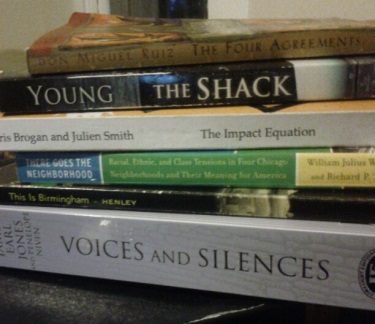 I’m already two weeks into the next round, meaning I should really be updating my Goodreads profile with the latest titles I’m attempting to devour in the next two months. (Yes, there are other books listed, I’ve just chosen to delay their completion for the time being.) I’ve even created a new list of sites I’ve got to check on a regular basis as I try to understand what I’m reading.
I’m already two weeks into the next round, meaning I should really be updating my Goodreads profile with the latest titles I’m attempting to devour in the next two months. (Yes, there are other books listed, I’ve just chosen to delay their completion for the time being.) I’ve even created a new list of sites I’ve got to check on a regular basis as I try to understand what I’m reading.
What am I talking about? One of my personal goals for the year: 18 in 12.
I got the bug via Chris Brogan’s Three Book Diet (or #3BD as it was hashtagged during its infancy). Chris’ original intent was to look at three books for the year, reading them over and over in order to gain a better understanding of their content. He chose to stop his effort earlier this month for some pretty good reasons, though some have chosen to continue with the original plan.
I do not have the focus necessary to only tackle three books for a twelve-month period, but I also know that I work really well when I’m on a deadline – even if it’s an artificial one. I knew I needed to be a guided process of sorts as I reset and reboot my habits.
So, I decided on 18 in 12.
I started back in mid-November with a stack of books by the bedside table:
- The Impact Equation (yes, an advance copy of Brogan’s latest book)
- The Shack (one I’ve had difficulty getting through because of the subject matter)
- The Four Agreements (one I’ve read a few times already)
The idea is to take the opportunity to dig a little deeper into your choices and pull out some more significant lessons. I’m using it as an excuse to move “off the grid” so to speak – exploring writing not necessarily focused on urbanism directly.
Has it been helpful/productive?
I think it’s safe to say the first three books have been quite useful.
- I wrote a review of Chris’ book early on, describing how I was going to apply the book’s lessons in my life for the coming year.
- I battled through some inner demons to tackle The Shack and get a little more comfortable with my own beliefs and how I can live them out daily in a more authentic way. It also helped me get past worrying about the “this is the only way” approach I run into often. It’s always enlightening to consider a different point of view.
- The tenets of The Four Agreements seemed to work perfectly as a framework applied to creating and maintaining a blog. I’ve written a series of posts about the concept (here’s the link to the first one; the links to the other parts are on that page too) and I got to test drive a presentation at FoodBlogSouth this past Saturday.
It’s resulted in a much more strategic approach to tackling how I organize and complete tasks. The Kraft paper on the walls of my home office have new ideas being scribbled on them. The list of potential investigative projects for The Terminal and Urban Conversations are too numerous to mention – and a lot of fun to be working through.
I’ve been able to rediscover the reason I started blogging in the first place – a chance to share ideas and get some feedback while possibly meeting new people. It’s become a game – one when you’re going against the clock and where I find a lot of joy.
The idea of diversifying what you read and how you read isn’t new. I just stumbled across this piece over on Million Pens reminding folks why it can be so helpful and essential.
Here are The Next 3 Books I’m already tackling:
- There Goes the Neighborhood (a look at diversity and neighborhood development)
- Voices and Silences (James Earl Jones’ autobiography)
- This is Birmingham (an account on the city’s early history by John Henley, Jr.)
I admit my original goal of not digging into urban issues as much has slipped away, but it’s a result of what I got out of the first set of books. As I prepare to apply those lessons, I needed to once again familiarize myself with some issues vital to being able to think of new solutions to problems I’d like to tackle. I’m also looking forward to reading some historical or general fiction when the next round starts in March. I’m looking forward to seeing how my writing evolves as a result of this experiment.
By the way, if anyone’s got suggestions on books to consider, I’m all ears.
Cheers.
